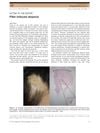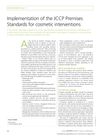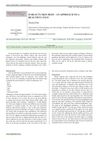 126 citations,
April 2015 in “Clinical, cosmetic and investigational dermatology”
126 citations,
April 2015 in “Clinical, cosmetic and investigational dermatology” Choosing the right patients, using proper techniques, and having thorough knowledge are key to preventing and managing dermal filler complications.
 4 citations,
May 2023 in “JAAD case reports”
4 citations,
May 2023 in “JAAD case reports” Hyaluronic acid fillers for temporal lifting can cause hair loss without scarring.
 November 2024 in “Journal of Cosmetic Dermatology”
November 2024 in “Journal of Cosmetic Dermatology” Early treatment can reverse hair loss from dermal fillers.
[object Object]  April 2023 in “Clinical and experimental dermatology”
April 2023 in “Clinical and experimental dermatology” A new treatment using hydroxychloroquine, hyaluronidase, and steroids may improve hair loss from dermal filler complications.
 June 2019 in “The Egyptian Journal of Histology”
June 2019 in “The Egyptian Journal of Histology” Hyaluronic acid injections improve skin thickness and quality, protecting against aging in rats.
34 citations,
September 2020 in “Clinical, cosmetic and investigational dermatology” Hyaluronic acid increases collagen synthesis safely, while poly-L-lactic acid may cause complications by affecting fibroblasts.
 6 citations,
June 2019 in “Journal of dermatology”
6 citations,
June 2019 in “Journal of dermatology” Dermal fillers can cause hair loss, so dermatologists should be aware.
[object Object]  2 citations,
June 2018 in “Journal of Aesthetic Nursing”
2 citations,
June 2018 in “Journal of Aesthetic Nursing” Some improvements in the aesthetics sector have been made, but patient protection is still lacking due to no compulsory register for practitioners and non-prescription dermal fillers.
August 2023 in “Diagnostics” Ultra-high-frequency ultrasound effectively evaluates the impact of hyaluronic acid fillers in reducing nasolabial fold wrinkles over time.
September 2017 in “Journal of aesthetic nursing” The main treatments for wrinkle reduction are botulinum toxin, dermal fillers, radiofrequency, and ultrasound.
 April 2024 in “International Journal of Dermatology”
April 2024 in “International Journal of Dermatology” Filler injections can cause temporary hair loss, but hyaluronidase can help restore hair within a few months.
 14 citations,
August 2017 in “Dermatologic surgery”
14 citations,
August 2017 in “Dermatologic surgery” Men are getting more facial fillers, and doctors should use different techniques and fillers for men's unique facial features to get natural results.
 December 2017 in “Journal of Aesthetic Nursing”
December 2017 in “Journal of Aesthetic Nursing” Level 7 qualifications for aesthetic procedures like botox and fillers are not mandatory, but they can improve skills and credibility.
81 citations,
January 2000 in “American journal of clinical dermatology” Various treatments can improve post-acne scars, but results vary.
 38 citations,
February 2016 in “Surgery Journal”
38 citations,
February 2016 in “Surgery Journal” Facial plastic surgery has evolved to focus on less invasive techniques and innovative technologies for cosmetic and reconstructive procedures.
 25 citations,
September 2019 in “PubMed”
25 citations,
September 2019 in “PubMed” Platelet-Rich Plasma (PRP) is helpful for skin and hair treatments and works better when combined with other procedures.
 21 citations,
April 2019 in “Endocrinology and Metabolism Clinics of North America”
21 citations,
April 2019 in “Endocrinology and Metabolism Clinics of North America” Transgender patients need proper skin care, especially when undergoing hormone treatments, to manage issues like acne and hair loss.
 3 citations,
January 2020 in “Plastic and Aesthetic Research”
3 citations,
January 2020 in “Plastic and Aesthetic Research” Non-surgical procedures can help reduce wrinkles and stimulate skin repair by understanding skin aging at the molecular level.
 3 citations,
January 2021
3 citations,
January 2021 Non-surgical treatments like thread lifts, PRP therapy, HIFU, and radiofrequency effectively rejuvenate and tighten facial skin.
 2 citations,
November 2014
2 citations,
November 2014 Common cosmetic dermatology techniques improve skin damaged by the sun and aging.
 1 citations,
April 2021 in “Clinical and Experimental Dermatology”
1 citations,
April 2021 in “Clinical and Experimental Dermatology” The COVID-19 pandemic has caused a 57% increase in interest in facial cosmetic procedures, leading to calls for better industry regulation and professional standards.
 1 citations,
August 2023 in “Journal of the American Academy of Dermatology”
1 citations,
August 2023 in “Journal of the American Academy of Dermatology” Dermatologists should be aware of and manage alopecia risks from certain cosmetic procedures.
 1 citations,
January 2009 in “Elsevier eBooks”
1 citations,
January 2009 in “Elsevier eBooks” The document concludes that a deeper understanding of skin aging and photodamage is needed to create better skin treatments.
Using fillers and neurotoxins together can improve the look of aging eyebrows.
 September 2023 in “Journal of the American Academy of Dermatology”
September 2023 in “Journal of the American Academy of Dermatology” Increased awareness and research are needed to prevent hair loss from cosmetic procedures.
 April 2021 in “Journal of Cosmetic Dermatology”
April 2021 in “Journal of Cosmetic Dermatology” The May 2021 issue of the Journal of Cosmetic Dermatology suggests injectables are becoming more reliable and may reduce the need for cosmetic surgery.
 July 2019 in “Journal of Aesthetic Nursing”
July 2019 in “Journal of Aesthetic Nursing” The JCCP's Premises Standards aim to make non-surgical cosmetic treatments safer and higher quality.
 July 2014 in “Nasza Dermatologia Online”
July 2014 in “Nasza Dermatologia Online” True facial beauty is natural, but cosmetic procedures can enhance it temporarily.
 May 2014 in “Journal of Aesthetic Nursing”
May 2014 in “Journal of Aesthetic Nursing” Health Education England is moving forward with phase two of their cosmetic intervention project after a successful summit and plans for future training standards.
 October 2020 in “Journal of Aesthetic Nursing”
October 2020 in “Journal of Aesthetic Nursing” The JCCP wants new rules for the UK aesthetics industry to improve safety and standards.
























